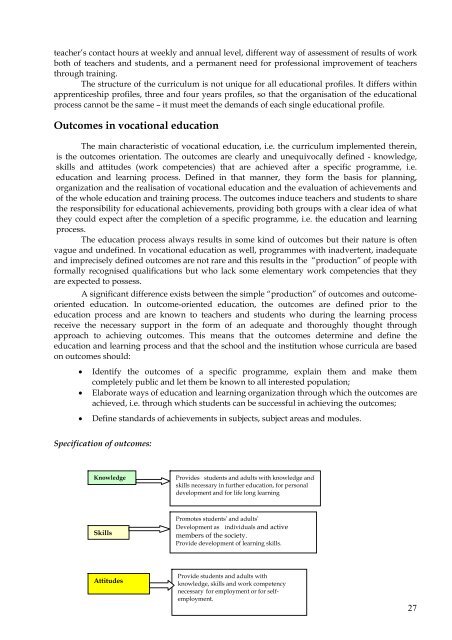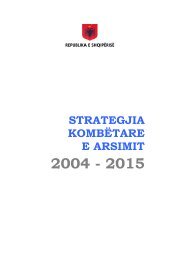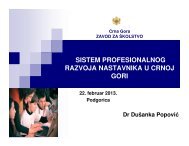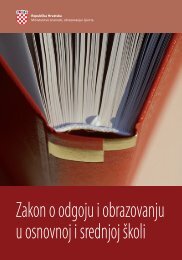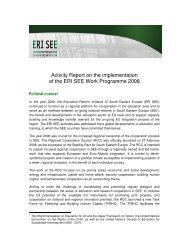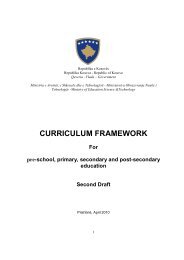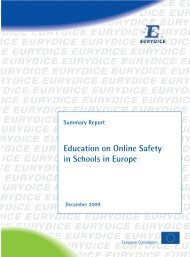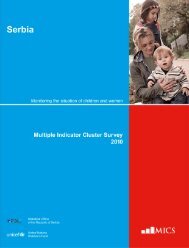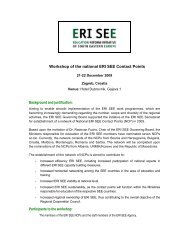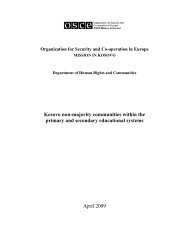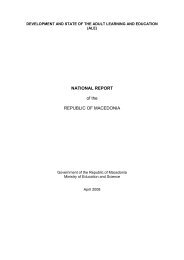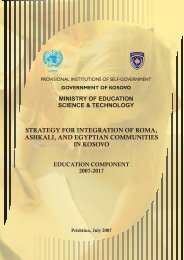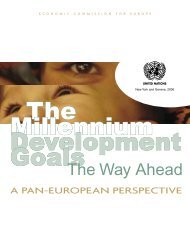concept of vocational education and training in serbia - vet reform ...
concept of vocational education and training in serbia - vet reform ...
concept of vocational education and training in serbia - vet reform ...
Create successful ePaper yourself
Turn your PDF publications into a flip-book with our unique Google optimized e-Paper software.
teacher’s contact hours at weekly <strong>and</strong> annual level, different way <strong>of</strong> assessment <strong>of</strong> results <strong>of</strong> workboth <strong>of</strong> teachers <strong>and</strong> students, <strong>and</strong> a permanent need for pr<strong>of</strong>essional improvement <strong>of</strong> teachersthrough <strong>tra<strong>in</strong><strong>in</strong>g</strong>.The structure <strong>of</strong> the curriculum is not unique for all <strong>education</strong>al pr<strong>of</strong>iles. It differs with<strong>in</strong>apprenticeship pr<strong>of</strong>iles, three <strong>and</strong> four years pr<strong>of</strong>iles, so that the organisation <strong>of</strong> the <strong>education</strong>alprocess cannot be the same – it must meet the dem<strong>and</strong>s <strong>of</strong> each s<strong>in</strong>gle <strong>education</strong>al pr<strong>of</strong>ile.Outcomes <strong>in</strong> <strong>vocational</strong> <strong>education</strong>The ma<strong>in</strong> characteristic <strong>of</strong> <strong>vocational</strong> <strong>education</strong>, i.e. the curriculum implemented there<strong>in</strong>,is the outcomes orientation. The outcomes are clearly <strong>and</strong> unequivocally def<strong>in</strong>ed - knowledge,skills <strong>and</strong> attitudes (work competencies) that are achieved after a specific programme, i.e.<strong>education</strong> <strong>and</strong> learn<strong>in</strong>g process. Def<strong>in</strong>ed <strong>in</strong> that manner, they form the basis for plann<strong>in</strong>g,organization <strong>and</strong> the realisation <strong>of</strong> <strong>vocational</strong> <strong>education</strong> <strong>and</strong> the evaluation <strong>of</strong> achievements <strong>and</strong><strong>of</strong> the whole <strong>education</strong> <strong>and</strong> <strong>tra<strong>in</strong><strong>in</strong>g</strong> process. The outcomes <strong>in</strong>duce teachers <strong>and</strong> students to sharethe responsibility for <strong>education</strong>al achievements, provid<strong>in</strong>g both groups with a clear idea <strong>of</strong> whatthey could expect after the completion <strong>of</strong> a specific programme, i.e. the <strong>education</strong> <strong>and</strong> learn<strong>in</strong>gprocess.The <strong>education</strong> process always results <strong>in</strong> some k<strong>in</strong>d <strong>of</strong> outcomes but their nature is <strong>of</strong>tenvague <strong>and</strong> undef<strong>in</strong>ed. In <strong>vocational</strong> <strong>education</strong> as well, programmes with <strong>in</strong>advertent, <strong>in</strong>adequate<strong>and</strong> imprecisely def<strong>in</strong>ed outcomes are not rare <strong>and</strong> this results <strong>in</strong> the “production” <strong>of</strong> people withformally recognised qualifications but who lack some elementary work competencies that theyare expected to possess.A significant difference exists between the simple “production” <strong>of</strong> outcomes <strong>and</strong> outcomeoriented<strong>education</strong>. In outcome-oriented <strong>education</strong>, the outcomes are def<strong>in</strong>ed prior to the<strong>education</strong> process <strong>and</strong> are known to teachers <strong>and</strong> students who dur<strong>in</strong>g the learn<strong>in</strong>g processreceive the necessary support <strong>in</strong> the form <strong>of</strong> an adequate <strong>and</strong> thoroughly thought throughapproach to achiev<strong>in</strong>g outcomes. This means that the outcomes determ<strong>in</strong>e <strong>and</strong> def<strong>in</strong>e the<strong>education</strong> <strong>and</strong> learn<strong>in</strong>g process <strong>and</strong> that the school <strong>and</strong> the <strong>in</strong>stitution whose curricula are basedon outcomes should:• Identify the outcomes <strong>of</strong> a specific programme, expla<strong>in</strong> them <strong>and</strong> make themcompletely public <strong>and</strong> let them be known to all <strong>in</strong>terested population;• Elaborate ways <strong>of</strong> <strong>education</strong> <strong>and</strong> learn<strong>in</strong>g organization through which the outcomes areachieved, i.e. through which students can be successful <strong>in</strong> achiev<strong>in</strong>g the outcomes;• Def<strong>in</strong>e st<strong>and</strong>ards <strong>of</strong> achievements <strong>in</strong> subjects, subject areas <strong>and</strong> modules.Specification <strong>of</strong> outcomes:KnowledgeProvides students <strong>and</strong> adults with knowledge <strong>and</strong>skills necessary <strong>in</strong> further <strong>education</strong>, for personaldevelopment <strong>and</strong> for life long learn<strong>in</strong>gSkillsPromotes students’ <strong>and</strong> adults’Development as <strong>in</strong>dividuals <strong>and</strong> activemembers <strong>of</strong> the society.Provide development <strong>of</strong> learn<strong>in</strong>g skills.AttitudesProvide students <strong>and</strong> adults withknowledge, skills <strong>and</strong> work competencynecessary for employment or for selfemployment.27


